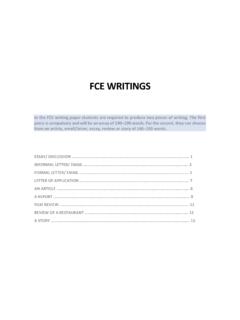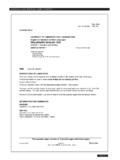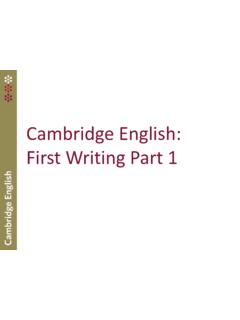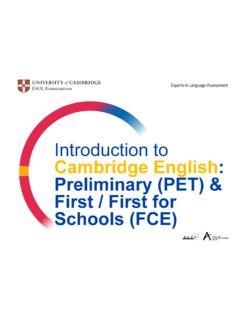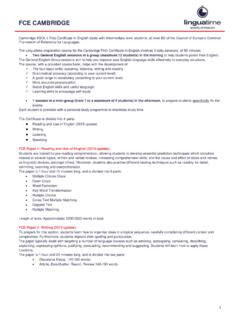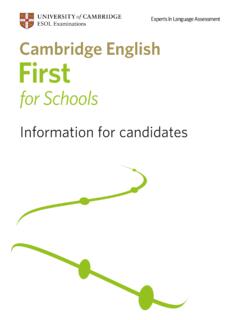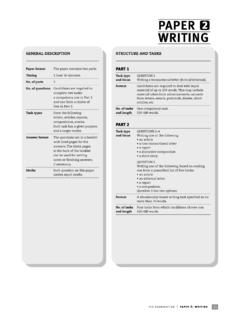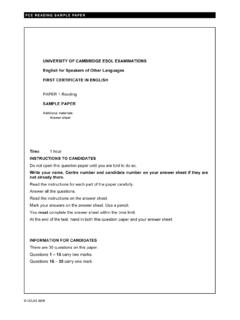Transcription of University of Cambridge First Certificate in English (FCE)
1 97 HILLSIDE PRESS PHOTOCOPIABLE Journeys B2 Teacher s Resource Pack FCE Practice Exam FCEU niversity of CambridgeFirst Certificate in English (FCE) University of CambridgeFirst Certificate in English (FCE)98 HILLSIDE PRESS PHOTOCOPIABLE Reading FCE Practice Exam Journeys B2 Teacher s Resource PackPart 1 You are going to read an extract from a novel. For questions 1 8, choose the answer (A, B, C or D) which you think fits best according to the text. paper 1: Reading (1 hour)The bus was crowded with tourists, most of whom, like us, were unfamiliar with local customs and probably unsure of which stop to get off at. It was the middle of summer, and we were already hot and tired, even though it was still morning. The bus had no air conditioning and, as there weren't any free seats, we'd been standing for at least twenty minutes as the rusty old vehicle made its way along the winding, bumpy roads.
2 It was an effort for us to keep our balance and not fall down or bump into other passengers as the bus went round sharp bends or swerved to avoid the numerous holes in the there were so many people around us, it was difficult to see out of the windows, so we weren't quite sure where we were. Thinking, after the bus had crossed a bridge, that we had reached the ancient site that we wanted to visit, we pressed the button by the door to let the driver know that we wanted to get off at the next stop. When the bus stopped and the doors opened, however, we realised that the site was still a long way off, and so we stayed on board. No one got off the bus. The doors closed and the bus set off again. Just before the next stop, another passenger must have pressed the button, because, on reaching the stop, the bus once more came to a noisy halt and the doors opened with a loud rattle.
3 However, once again, no one got off. We had been too busy chatting to see who it was who had pressed the button and, unaware of our predicament, we continued our conversation. However, after a few moments, we realised that the bus hadn't set off again. Sensing that something was wrong, all the passengers turned and looked in the direction of the our horror, the enormous bus driver had got out of his seat, obviously with some effort, since he was bright red, and was heading straight towards us with a face like thunder. He stopped a few metres from us and started shouting at the top of his deep, booming voice. His voice matched his expression perfectly. Perhaps fortunately, we didn't speak the language, so we understood nothing of what he was yelling. We realised that he was angry with us because the button had been pressed twice, forcing him to stop the bus for no reason since nobody had got off.
4 `Sorry, sorry,' I said, trying to sound as apologetic as possible, and with a pained expression on my face.`We're really sorry,' my friend added, `but we only did it once. It wasn't us the second time. It must have been someone else. We weren't sure where to get off, you see and ..'Her voice gradually trailed off as she saw the blank look on the bus driver's face. There was obviously no reason to continue. He looked even angrier than before if that was possible. Still fuming, he turned round and got back into his seat. The bus set off again. We thought it wise to move away from the door so that we wouldn't be blamed if someone pressed the button a third time. We were pretty sure that if it happened again, we would be physically thrown off the bus - at best! Eventually, we arrived at our destination, not a moment too soon, we felt, and we got off the bus with a great sense of relief.
5 As the vehicle moved off, we could just make out, through the cloud of dust that it left behind, a group of boys who were standing at the rear window. They were looking at us and laughing. We wondered if we had been the victims of a practical joke.`Oh, well, let's just hope we don't get on the same bus on the way back!' my friend remarked as we headed for the wonders of the ancient ruins which were still some way ahead of 17line 3799 HILLSIDE PRESS PHOTOCOPIABLE Journeys B2 Teacher s Resource Pack FCE Practice Exam ReadingPart 1 1 What do we know to be true about the passengers on the bus? A Some of them hadn t had to pay for their seats. B They were all tourists. C They kept on bumping into each other. D Not all of them knew the route they were on. 2 Why weren t the writer and her friend sure about exactly where they were?
6 A The windows of the bus were dirty. B It was dark outside. C They had never been to the area before. D The bus was crowded. 3 What predicament is referred to in line 17? A They didn t have bus tickets. B They were on the wrong bus. C They didn t know where to get off the bus. D The bus driver was angry with them. 4 Why does the writer say, fortunately, we couldn t speak the language ? A They didn t have to explain to the bus driver what had happened. B They didn t need to speak to the driver, and they couldn t have, anyway. C They didn t want to know what the bus driver was saying. D The other passengers couldn t understand what they had been saying. 5 Why did the writer s friend s voice gradually trail off? A The bus driver looked even angrier than before.
7 B She expected the writer to say something. C The bus driver realised what had happened. D She realised the bus driver didn t understand English . 6 How did the writer and her friend make sure that they didn t make the driver even angrier? A They kept their distance from the door. B They got off the bus. C They went to the rear of the bus. D They spoke to him. 7 Why does the writer say at best in line 37? A Getting thrown off the bus was the worst-case scenario. B The driver might do something worse than throwing them off the bus. C The bus driver would be justified in throwing them off the bus. D Someone else might get into trouble this time. 8 What practical joke did the boys probably play on the writer and her friend? A They made sure that the writer and her friend got covered in dust.
8 B They pressed the button the second time, knowing that the writer would get the blame. C They arranged for the writer and her friend to get off the bus a long way from the ancient site. D They made sure that the writer and her friend wouldn t find anywhere to sit on the PRESS PHOTOCOPIABLE Reading FCE Practice Exam Journeys B2 Teacher s Resource PackPart 2 A Swimmers have even been known to be joined by whales! B I, on the other hand, am much less interested in team sports. C They end up swimming in packs which can be quite a tangle of arms and legs when they turn at the buoys. D Although, on this occasion, the race took place in a standard swimming pool. E It certainly needs a lot of preparation. F My mother spent a lot of weekends taking Mike and me to competitions in different towns and cities.
9 G I was three years old when I learnt to swim at our local pool. H There, the course was set in the rowing basin. You are going to read an article about a woman who is a marathon swimmer. Seven sentences have been removed from the article. Choose from the sentences A H the one which fits each gap (9 15). There is one extra sentence which you do not need to as long as I can remember, I have been swimming. 9 My brother, Mike, who was then nine, trained five days a week with the local swimming team, so I soon got used to the idea that competitive swimming would be part of my life too. Mike was excellent at the sprints, the 50-metre and 100-metre races. Joining the world of competitive swimming, I began to realise that, while I didn t have the edge for such bursts of speed, I had plenty of strength and stamina for the 800-metre and 1,500-metre events.
10 10 When we were scheduled for different competitions on the same day, my father took one of us to the other venue. Mike managed to get a gold in the national championships, but then he gave up racing for water polo, a move that my father really seemed to approve of. Since then he has obtained a place on the national polo team and taken part in quite a few international tournaments. 11 I suppose I have simply become accustomed to working on my own, and having to rely on what I can achieve for myself. I was actually making a name for myself in the 1,500-metre freestyle races, where it was becoming rare for me not to finish in one of the First three places. Then one day Daisy, who is my e-pal from Australia, told me that she had become hooked on marathon swimming usually takes place in the sea or in large lakes.
